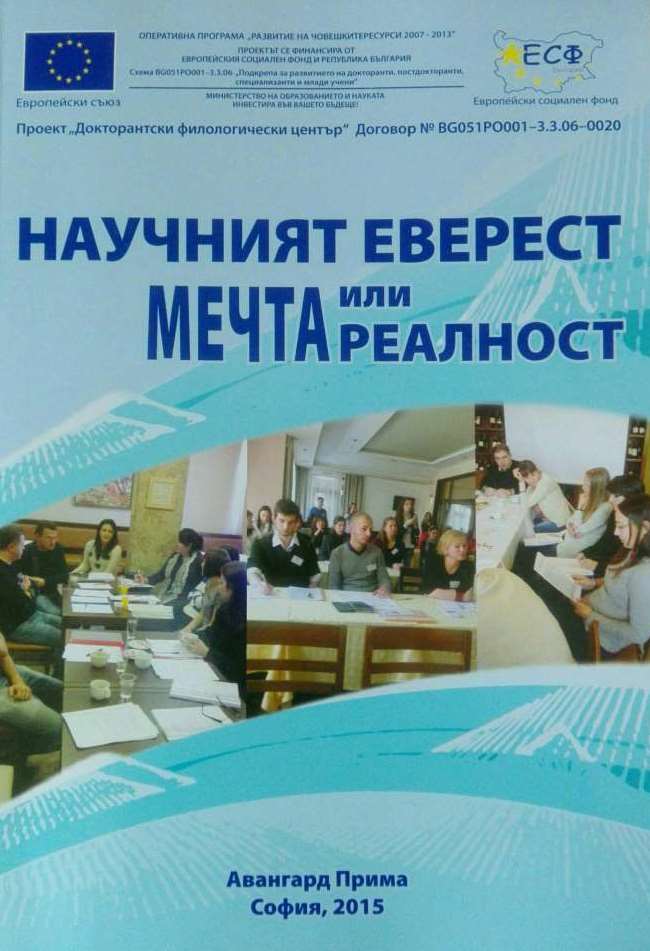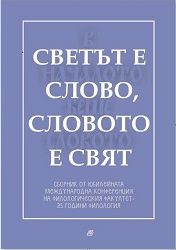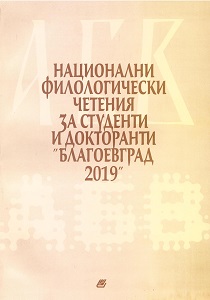
We kindly inform you that, as long as the subject affiliation of our 300.000+ articles is in progress, you might get unsufficient or no results on your third level or second level search. In this case, please broaden your search criteria.


This article studies the biographical aspects of the poem „Visiting my Home Paper Mill”. It reviews several versions of the poem and compares them. The action in the poem is followed chronologically and sequentially. The study aims at proving that Binyo Ivanov's poetry often contains references to his own life and if it is interpreted through this prism, it would become more clear and understandable.
More...
This paper studies the literary tales of Vesa Paspaleeva between the two world wars. Her original tales, which have features of her individual style, are reviewed. The paper is an attempt to identify certain thematic and storytelling features and provide comments of the paratext of these works.
More...
This paper studies two modernistic poems – „Zatochenici” (P. Yavorov) and „Septemvri” (Geo Milev). Some relations between the two poems are shown: their connections with certain historical event, the crash of the national ideal for unity, the journey – by boat in „Zatochenici” and from night to dawn in „Septemvri”, the concept of the mother land, the lost paradise and the paradise on Earth.The conclusion shows how in a work known as a patriotic poem we find symbols of modernism and in a modernistic poem we find symbols of Bulgarian cultural history.
More...
The relationship between the village and the city as literary subjects in the works of Ivan Vazov, Mihalaki Georgiev, Stamatov, Todor Vlaykov, Georgi Raychev, Anton Strashimirov for the most part acquires an adversative nature. The parameters of this opposition could be found in the separate areas of the lives of the citizen and the villager: the toponymic system, the types of contact in the village and the city, the problem of labor in both social structures etc. The subject of suffering of the patriarchal man and the citizen reveals a specific relevance between the two social structures (village, city), which is characterized by blurring the borders of the opposition between them, erasing the contrasts, and re-conciliating the characters of the villager and the citizen in one collective persona of the suffering man.
More...
This paper focuses mainly on how Bulgaria is described and how the Bulgarian national character is presented in the novel „Apostoloff” by German author of Bulgarian origin Sybille Lewitscharoff. Our main goal is to study which specific segments of Bulgarian reality are selected and how they are relevant to the personal memories of the narrator. We will also analyze the artistic resources, which contribute to the construction of foreignness in the image of the Bulgarian.
More...
This article studies the characters of the narrator in the novel „The World Is Big and Salvation Lurks Around the Corner” (1996/1997) by Ilija Trojanov. It studies how the changes of the narrator in different fragments of the novel are connected to build the plot. The article also reviews the functions of the narrators by creating images of man and world.
More...
This report describes the changes in children's literature, which was put under the total control of the ideology that came into power after 9. IX. 1944. After that date, the poetry for children was primarily meant to serve the tasks of the Communist upbringing and propagate the values of the doctrine among the youngest citizens of the People`s Republic. The present report shows the strong commitment of the children’s literature with the power, as well as its gradual liberation from the ideological control. As an ideological and aesthetic trend, socialist realism, like any other phenomenon in the cultural sphere, is subjected to the changes in the sociopolitical life, and in this paper we follow its transformations in the period 1944-1989.
More...
The current report aims at following the empirical and rational ways of human knowledge and their adequacy through the character of someone’s double in the science fiction novels „Intra” by Nedialka Mihova and „Clones” by Vesela Lyutskanova. We focus on several issues: How is human knowledge functioning? Is the human way of understanding universal? Are we willing to ignore humanity for the sake of science? The double’s materialization is made possible through technology and becomes a scientific method to expand its knowledge of the surrounding world. The knowledge gained by the characters in the novels affirms their individuality, despite their unnatural „creation” and existence.
More...
This report aims at revealing the character of communist woman in the poetry of Pavel Matev and Vladimir Bashev. We focus on several issues: what happened in Bulgarian poetry after 1944 and how the communist party intervened into culture, art and literature. This report will show how the woman was pictured in the poetry during this period and why she was transformed into a cliché.
More...
This text aims to present some experiences and impressions of Bulgarian writers in Italy. Traditionally, Italy is perceived by Bulgarians as a cultural etalon and a cradle of the European Renaissance. There are a few accents in the focus of the research: the act of travelling and the emotions coming out of that; the reaction of the Eastern man when he contacts the Western culture; perception of the cultural monuments; self-reflection and thoughts of the travelers; images of the other; comparison between the premised (expected) image of Italy and the seen/experienced.
More...
The main purpose of the text is to present how P. K. Yavorov comes into the Bulgarian Canon. On the one hand, there are three anthologies containing works of the poet: 1) "Bulgarian Anthology" which is collected by D. Podvarzachov and D. Debelyanov; 2) "The Rays of Poetry" named by the compiler – Georgi Bakalov, "poetical collection", and 3) "Anthology of Bulgarian Poetry" by Geo Milev. On the other hand, Yavorov comes to the Bulgarian Canon thanks to the textbookish literature.
More...
The paper gives definition of the concept “literature of the third age” and attempts to make into a system the figure of the past in it. The author accepts the thesis that the past is time of development. The time is the same for the authors that went through mental trauma in the past: refugees and Bulgarian Mohammedans. The accent is on the specific reception of the literature of the third age.
More...
In the report, the features of a Bulgarian manuscript from the 19th century are analyzed. The manuscript is part of Kopitar’s collection gathered by the Viennese Slavic scholar Bartholomew Kopitar and kept in the People’s and the University Library in Ljubljana, Slovenia. The manuscript has a press-mark “Cod. Kop. 28”. The letters design is in the spirit of the classical Bulgarian tradition. The text contains poetic attempts by an unknown author. In the report, graphical, phonetic and morphological features and characteristics are observed to assume the author’s affiliation to a specific Bulgarian dialect area.
More...
The article presents an analysis of the ten issues published during 1906 (volume XIII) of magazine “Bulgarska sbirka” and also Ivan Vazov’s essential contributions to its advancement. The “patriarch of Bulgarian literature” has laid the foundations of Bulgarian realism and thus has prefigured the development of Bulgarian literature (XIX – XX century). Every issue of magazine “Bulgarska sbirka” (edited by Stefan Bobchev) begin with the “Legends at Tsarevets” in this way creating a mindset for understanding the magazine.
More...
The text analyzes the ten books of the first year of the journal Zlatorog (1920), the continuity between the journals Zlatorog and Misal (Thought) and the transfer of the cult for the fabulous Foursome onto the pages of Zlatorog. The presence of Pencho Slaveikov and Yavorov in the journal does not have only a jubilee character, they are valuable reference points in many critical texts that are not dedicated to them.
More...
A brief review of published materials containing humor in the Rhodope dialect was conducted, including humor from the Rhodope Mountain towns, villages, and neighborhoods of Smolyan, Raykovo, Dunevo, Momchilovtsi, Slaveino, Chokmanovo, Chepelare, Stikal, Devin and Zlatograd. Some common characteristic features of Rhodope jokers are discussed, as well as the themes and peculiarities of various popular jokes from the Rhodope Мountains in the South of Bulgaria. The personality of the witty Rhodope jokester emerges, multifaceted and charming, embodying the spirit of the times and the surroundings, preserving and honoring the memory and the anecdotes of humorists from the past. A glimpse toward the future discovers it is fashionable to use the Rhodope dialect in social media nowadays, even by young people.
More...
The article analyzes the relationship between Ivanka Boteva and her first-born son Hristo Botev. Some letters of Ivanka Boteva, Hristo Botev's brothers and relatives of their family are analyzed with the apparatus of psychoanalysis. It is shown that Botev was a ‘lost son’ for his family, but he was a devoted son to his Motherland ‘Mother Bulgaria’.
More...
Bulgarian children's folklore abounds in its diversity with children's songs, lullabies, sayings and proverbs, which have a special function in the educational and moral narrative. Thanks to the Bulgarian children's and youth literature, folklore is discussed as an expression of the children's world in its purity and authenticity. Folklore has a serious role in the construction of literary works, as it has the function of including and bringing together. Based on folk beliefs and superstitions, it is spiritually close to collective ideas and for this reason it is able to satisfy the psychological needs of the children's emotional world. Folklore is the wealth of a nation and thanks to it, the essence of creativity in everyday life and the soul of a nation is revealed.
More...
The purpose of this article is to present the prose of Konstatntin Kanev in the context of modern Bulgarian literature, the historical and social circumstances and influences and the specific aspects of reception of Kanev`s texts not only among his contemporaries but in cultural life now. The study sets out potential directions for debate in the present.
More...